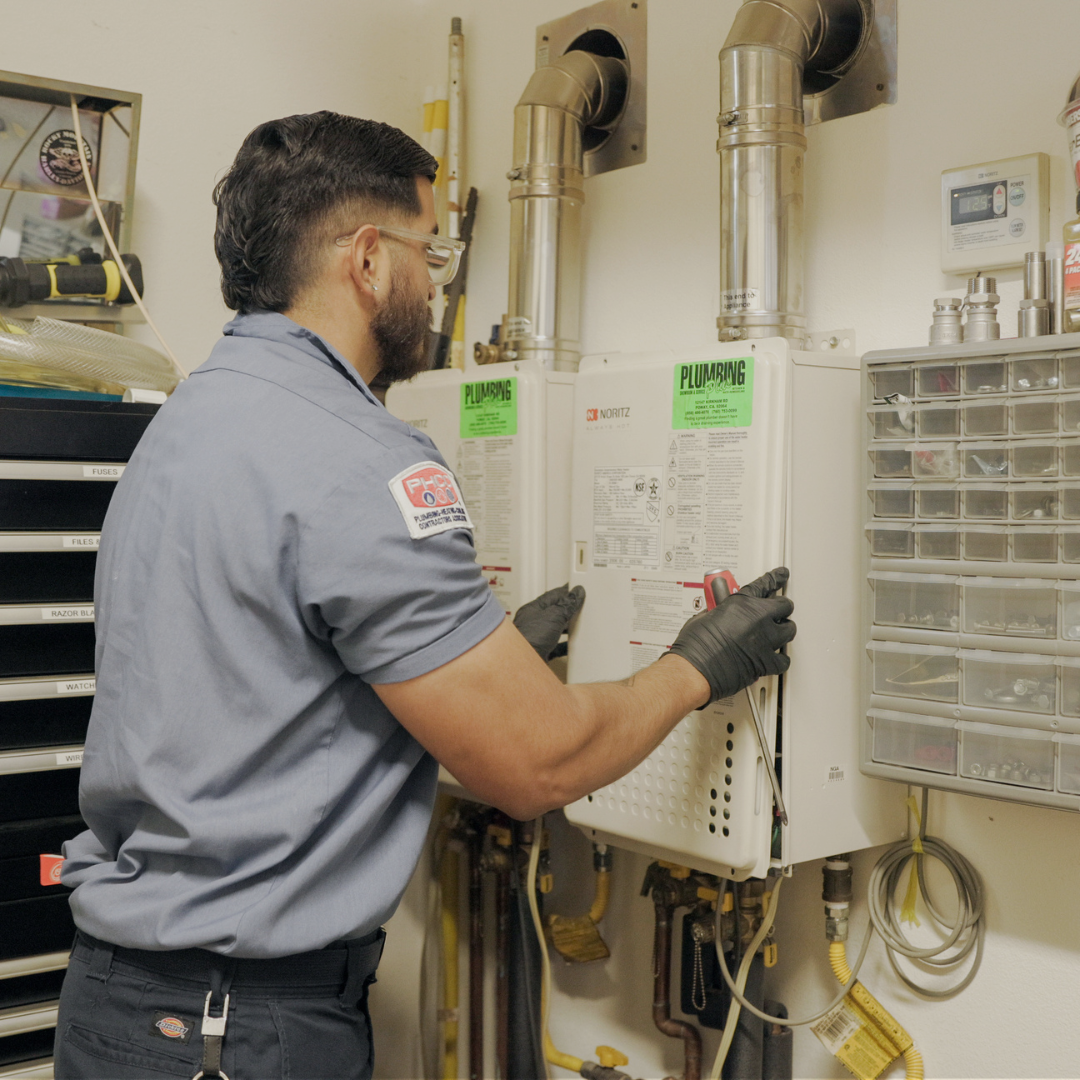San Diego Water Heater Maintenance
San Diego Water Heater Maintenance

Water heater maintenance is essential for extending the life of the unit, ensuring energy efficiency, and preventing unexpected breakdowns. Here’s what’s typically included in a comprehensive water heater maintenance service:
1. Flushing the Tank
Over time, sediment and mineral buildup accumulate at the bottom of the tank, reducing efficiency and potentially causing damage.
Flushing the tank removes these deposits, improving heating efficiency and extending the heater’s lifespan.
2. Checking the Anode Rod
The anode rod is a metal rod inside the tank that attracts corrosive particles to prevent the tank itself from rusting.
During maintenance, the technician inspects the rod for wear and replaces it if it's corroded, helping protect the tank from rust and corrosion.
3. Inspecting the Temperature & Pressure Relief (T&P) Valve
The T&P valve is a safety feature that releases pressure if the tank overheats or builds excessive pressure.
Checking that it functions properly is essential for safety; a faulty T&P valve could lead to tank rupture or leaks.
4. Testing the Thermostat and Heating Elements (Electric Water Heaters)
For electric heaters, the thermostat and heating elements are tested to ensure they’re working correctly.
If they’re not, the technician may adjust the thermostat or replace faulty elements to ensure optimal water heating.
5. Inspecting the Gas Burner & Pilot Assembly (Gas Water Heaters)
In gas heaters, the burner and pilot light assembly are checked for proper operation, clean flame, and safety.
The technician may clean the burner and confirm there are no gas leaks.
6. Examining the Venting System (Gas Water Heaters)
Proper venting is critical for gas water heaters to prevent carbon monoxide buildup.
The venting system is inspected for any blockages or leaks to ensure safe and effective venting of exhaust gases.
7. Checking and Adjusting the Thermostat
The thermostat setting is checked to ensure it’s at a safe and efficient temperature.
Adjusting the thermostat can help prevent scalding and reduce energy costs.
8. Inspecting the Tank for Signs of Corrosion or Leaks
The technician will look for any visible signs of rust, corrosion, or water leaks, which could indicate that the tank may need repair or replacement soon.
9. Insulating the Tank and Pipes (if necessary)
Adding insulation around the tank and hot water pipes helps improve energy efficiency, keeping the water hot for longer and reducing heat loss.
Are you a home or business owner in San Diego looking for top-notch water heater maintenance? Look no further than Plumbing Plus, the leading plumbing company specializing in all-things-water heaters. Our team of expert plumbers is dedicated to keeping your water heater in optimal condition, providing the highest level of service and customer satisfaction. Schedule your annual water heater maintenance today! Contact Us
Why Regular Maintenance Matters
Yearly water heater maintenance is crucial to ensure that your system works efficiently and reliably. Neglected water heaters may experience performance issues and even fail when you need them the most. That's why Plumbing Plus is here to help you with a comprehensive range of maintenance services tailored to meet your needs.
Tankless water heaters also require maintenance, although they have different needs compared to traditional tank heaters. Here’s what a typical maintenance service includes for tankless units:
1. Descaling and Flushing the System
Mineral buildup, especially calcium and magnesium, can clog the heat exchanger, reducing efficiency and potentially damaging the unit.
Technicians use a descaling solution, typically vinegar or a specialized chemical, to flush the system and remove mineral deposits. This process is usually recommended annually, though it may be needed more often in areas with hard water.
2. Cleaning the Inlet Filter
Tankless water heaters often have a small filter on the cold-water inlet to trap debris and sediment.
Cleaning or replacing this filter helps maintain optimal water flow and protects internal components from blockages.
3. Inspecting the Heat Exchanger
The heat exchanger is a critical component that transfers heat to the water as it passes through. Over time, it can develop scaling or other buildup.
During maintenance, the technician will inspect the heat exchanger for scaling or corrosion, and clean it as needed to ensure efficient heat transfer.
4. Checking and Testing the Burner (for Gas Models)
For gas tankless water heaters, the burner assembly is inspected to ensure it’s clean and functioning properly.
Any dust, debris, or soot that has accumulated is removed, and the flame pattern is checked to ensure proper operation and efficiency.
5. Inspecting the Venting System and Exhaust (for Gas Models)
Proper ventilation is essential to prevent carbon monoxide buildup and ensure safe operation.
The technician inspects the venting system for blockages, leaks, or signs of wear to confirm safe exhaust of combustion gases.
6. Checking Electrical Components (for Electric Models)
The heating elements and wiring connections are checked to ensure they’re in good condition.
For electric tankless heaters, this may involve inspecting connections and verifying that the heating elements are functioning properly.
7. Testing Flow Rate and Water Temperature
The technician will test the system to ensure it’s delivering hot water at the desired temperature and adequate flow rate.
Adjustments may be made to the thermostat or settings to optimize performance and energy efficiency.
8. Inspecting for Error Codes and Diagnostic Issues
Many tankless water heaters have diagnostic systems that display error codes if something is wrong.
The technician will check for any stored error codes that indicate past issues and resolve any that might suggest maintenance needs.
9. Insulating Pipes (if necessary)
In colder climates or uninsulated spaces, the pipes leading to and from the heater may be insulated to reduce heat loss and improve energy efficiency.
Recommended Maintenance Frequency
Annually in most cases, especially for descaling if you have hard water.
Every 6 months for homes with very hard water or in cases where the water heater is heavily used (like in large households).

Trustworthy Local Plumbers
When it comes to San Diego water heater maintenance, trust the experts at Plumbing Plus. As a local plumbing company, we have been serving the community for years, earning a stellar reputation for our exceptional quality of work and dedication to customer service. Our team of skilled plumbers has the expertise and knowledge to handle all types of water heaters, old or new.
Contact Us Today for a Free Quote and Schedule Your Maintenance
Don't wait until your water heater breaks down. Contact Plumbing Plus today for a free quote or to schedule your annual maintenance. Our friendly and experienced team is ready to assist you and ensure that your water heater is running smoothly and efficiently all year round.
As your go-to San Diego plumber, Plumbing Plus is committed to providing outstanding customer service and top-quality workmanship. We pride ourselves on being reliable, professional, and affordable. Trust us with your water heater maintenance needs, and experience the Plumbing Plus difference. Contact us now to schedule your yearly water heater maintenance and enjoy peace of mind knowing that your system is in expert hands.

Keep Calm and Plumb On!
- Find Us!
- 12147 Kirkham Rd Ste A
Poway, CA 92064
